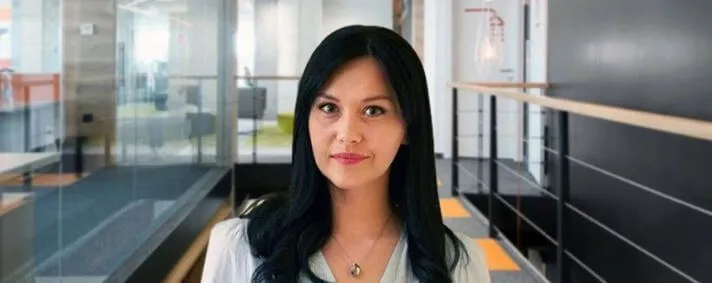How Do Health, Happiness and Productivity Impact Career Sustainability?

Table of contents
To find out more about the way we can work on our personal development, we’ve asked Katarina Milić, the Assistant Professor at the Department of Business Psychology at the Faculty of Law and Business Studies dr Lazar Vrkatić, to share with us her view on the things that can have an impact on the career development.

Katarina Milić
If our task was to direct a movie about a career, who would be the main characters?
Led by the concepts “A career with no limits” and “Protean career” which imply that an individual is the leading manager of his or her career and that he or she is fully responsible for their professional development, we would assign the leading role to the individual.
The movie would show how this individual copes with some of the challenges such as the changes in job positions, working assignments, organisations, maybe even professions. Every change in the professional life has an impact on personal life and vice versa.
Career advancement requires additional engagement and dedication to learning new skills. This often results in more time spent at work as well as various types of training which usually means less time for a family and meeting new potential partners.
How an individual will manage to create a right work-life balance, besides his or her skills, depends not only on the support of his family and other important people in his or her life, but also on the organisation where they work. We conclude that characters who play the family members of the person building his or her career and the members of the organisation where this individual works are vital in this movie.
Suppose we want to illustrate the importance of the organisation in this person’s career. In that case, we could screen his or her engagement in the organisation which doesn’t have the mentorship programme for new employees nor the culture of giving feedback, where there is no good communication with the management nor the awareness of the importance of work-life balance.
Furthermore, the scenario would look something like this: an individual leaves this organisation and finds a job in some other organisation whose culture nurtures the values he or she finds important, where the organisation is on a higher level, and the communication with the management is open and bi-directional. This culture also has mentorship programmes as well as programmes whose aim is to contribute to employees’ well-being. In this part of the movie, we, as viewers, see a bad guy in one organisation, and a hero who tries to help an individual improve his or her career in the other organisation.
Of course, besides the leading roles, the movie would have plenty of supporting but equally important characters. These roles would be assigned to a closer and broader social environment, which, in many direct and indirect ways, impacts the careers of individuals.
The Context and the Time - Crucial Factors for Career Sustainability
Career is a dynamic and cyclic concept which changes over time under the influence of various individual and social factors. This is why it is important that the movie about career depicts the career of one person over a more extended period and shows how this person copes with their ups and downs in their career.
Career can be successful one day, and stop being successful the next day. If we want to illustrate the career of a professional sportsman during a period when he achieves the best results, we, as viewers, would easily predict a successful long-term career. However, only one serious sports injury might jeopardise his triumphant sports career.
On the other hand, let’s take a woman’s career for an example. Imagine a situation when she is about to become a manager in the company while taking care of a member of her family who is suffering from some severe illness at the same time. So, even though we would feel happy about our hero’s career success, we would also have to face the fact that her career might be disrupted because she has to give priority to family obligations and not to work commitments.
This and similar examples remind us that we need to see career through the dimensions of time and context. Careers that last and that help employees stay healthy, happy and productive and that fit into a broader context of their life are the sustainable ones.
The Scenario for Achieving a Sustainable Career
How many times have we gone to work while being sick? How many times have we overused our resources to cope with the stress caused by working on some demanding projects? Each time an assignment was not in concert with our current physical and mental capacity, we put our health in danger. If we have done this more than once during our career, we made our career less sustainable, because we exploited most of our energy resources which we will need for other professional challenges that await us in future.
Happiness, as one of the pillars of a sustainable career, implies a subjective feeling of being successful and satisfied with our career in the context of life. If our professional life is in concert with our values, career goals and other life roles, we can say that our career has a tendency to become sustainable over time.
If, after achieving career success, we don’t feel satisfaction and don’t fulfil expectations of people who are important to us, it’s time we ask ourselves whether we are on the right career path or not. To overcome professional challenges, we need a lot of energy which we usually exploit from various sources that bring us satisfaction like family activities, socialising with friends or pursuing some hobby. If we deprive ourselves of these sources, we will end up with a lack of energy reservoirs which we might need when we are faced with new professional challenges.
Beside our task to maintain a high level of productivity at work daily, we have to gain new competencies that we might not need today, but that we will surely need tomorrow. To make our careers sustainable in terms of productivity which we can offer, we do not only need to be ready to work on ourselves and become better at what we do daily, but also to gain new competencies that will bring us value and make us more competitive in the job market.
Suppose we want our employees to realise their career potential in our company. In that case, we must provide them with working conditions in accordance with their physical and mental capacities so that they would have a chance to enjoy many life roles besides their professional ones. We need to allow them to use their knowledge and skills they have and gain competencies that they and the company will need in the future. The company’s assignment is to write a scenario where their employees’ careers will be sustainable and beneficial to the company’s performance and good reputation on the market.
Source: De Vos, A., Van Der Heijden, B. I. J. M., & Akkermans, J. (2018). Sustainable careers: Towards a conceptual model. Journal of Vocational Behavior. 117, 103196.


